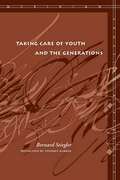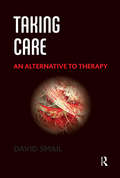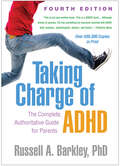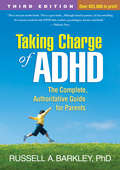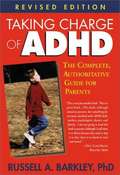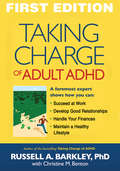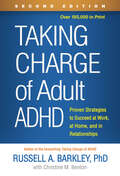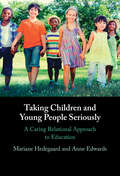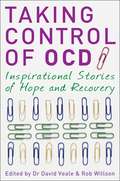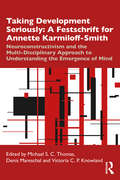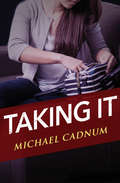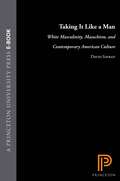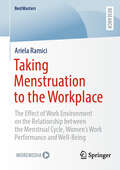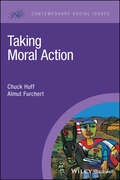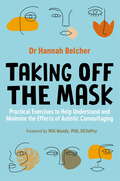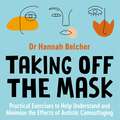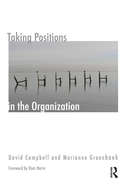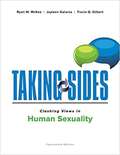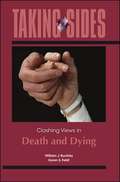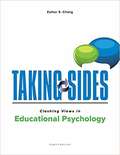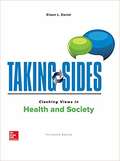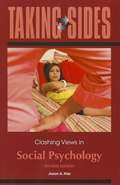- Table View
- List View
Taking Care Of Youth And The Generations
by Bernard StieglerTaking Care exposes the carelessness of these industries and urges the reader to re-enter the "battle for intelligence" against the drive-oriented culture of short-term ("short-circuited") attention characteristic of the negative aspects of the new technologies.
Taking Care: An Alternative to Therapy
by David SmailTaking Care established the author as an important social and political analyst whose background happened to be in clinical psychology. In this work the author develops the analysis of mental illness, and psychology in general, in the contexts of society, power and interest. People's experience is embodied in the world in which they exist. Notwithstanding the claims of some, psychology cannot, in the same way that magic cannot, change the nature of that experience fundamentally. At best, psychotherapy might provide a degree of understanding about that limitation. The historical relationship between psychology and magic is examined. The socio-political and economic structures of the society in which we live have the greatest influence on mental health, as on many other matters. Therefore, the individuation of focus in psychology on personal relationships, happiness, and sexuality can significantly miss the point. We need to develop political and social structures that 'take care' of people, to enable them to have meaningful 'public' lives.
Taking Charge of ADHD, Fourth Edition: The Complete, Authoritative Guide for Parents
by Russell A. BarkleyThe leading parent resource about attention-deficit/hyperactivity disorder (ADHD) and its treatment has now been revised and updated with the latest information and resources. Prominent authority Russell A. Barkley compassionately guides you to: *Understand why kids with ADHD act the way they do. *Get an accurate diagnosis. *Work with school and health care professionals to find needed support. *Implement a proven eight-step behavior management plan. *Build your child's academic and social skills. *Restore harmony at home. New to the fourth edition are a chapter on health risks associated with ADHD, the latest information on the causes of the disorder, current facts on medications, a new discussion of sibling issues, advice for parents who might have ADHD themselves, downloadable practical tools, and much more.
Taking Charge of ADHD, Third Edition
by Russell A. BarkleyFrom distinguished researcher/clinician Russell A. Barkley, this treasured parent resource gives you the science-based information you need about attention-deficit/hyperactivity disorder (ADHD) and its treatment. It also presents a proven eight-step behavior management plan specifically designed for 6- to 18-year-olds with ADHD. Offering encouragement, guidance, and loads of practical tips, Dr. Barkley helps you: *Make sense of your child's symptoms. *Get an accurate diagnosis. *Work with school and health care professionals to get needed support. *Learn parenting techniques that promote better behavior. *Strengthen your child's academic and social skills. *Use rewards and incentives effectively. *Restore harmony at home. Updated throughout with current research and resources, the third edition includes the latest facts about medications and about what causes (and doesn't cause) ADHD. See also Dr. Barkley's bestselling Taking Charge of Adult ADHD. Association for Behavioral and Cognitive Therapies (ABCT) Self-Help Book of Merit
Taking Charge of ADHD: The Complete, Authoritative Guide for Parents (Revised Edition)
by Russell A. BarkleyEmpowers parents of children with ADHD by giving them a step-by-step plan for behavior management, hard data on diagnosis and treatment, strategies for helping children succeed at school and in social situations, and information on advances in genetic and neurological research that enhance understanding of the causes of ADHD. Includes an annotated list of books, organizations, and Internet resources. This edition is revised to incorporate the most current information. Barkley is director of psychology and professor of psychiatry and neurology at the University of Massachusetts Medical Center. Annotation c. Book News, Inc., Portland, OR (booknews.com)
Taking Charge of Adult ADHD
by Russell Barkley Christine BentonFor adults with ADHD, problems with attention, planning, problem solving, and controlling emotions can make daily life an uphill battle. Fortunately, effective help is out there. No one is a better guide to how to get the best care and what sufferers can do for themselves than renowned ADHD researcher/clinician Russell A. Barkley. Dr. Barkley provides step-by-step strategies for managing symptoms and reducing their harmful impact. Readers get hands-on self-assessment tools and skills-building exercises, plus clear answers to frequently asked questions about medications and other treatments. Specific techniques are presented for overcoming challenges in critical areas where people with the disorder often struggle work, finances, relationships, and more. Finally, an authoritative one-stop resource for adults with ADHD who are ready to take back their lives.
Taking Charge of Adult ADHD: Proven Strategies to Succeed at Work, at Home, and in Relationships
by Russell A. BarkleyIf you're among the millions of adults with attention-deficit/hyperactivity disorder (ADHD), you need the latest facts about the disorder and its treatment. You need practical strategies to help develop your strengths and achieve your goals, whether on the job, in family relationships, or in personal pursuits. From renowned ADHD researcher/clinician Russell A. Barkley, this is the book for you. Dr. Barkley takes you through the process of seeking professional help, addresses frequently asked questions about medications and other treatments, and offers a wealth of advice and tips--all science-based. Featuring the latest resources and medication facts, the revised and updated second edition includes new or expanded discussions of mindfulness, emotional self-control, time management, building a successful career, maintaining a healthy lifestyle, and more. Finally, an authoritative one-stop resource to help you take back your life from ADHD. Mental health professionals, see also Cognitive-Behavioral Therapy for Adult ADHD: Targeting Executive Dysfunction, by Mary V. Solanto.
Taking Charge of Anger, Second Edition
by W. Robert NayThis straight-talking book-grounded in over 25 years of experience-has already helped many tens of thousands of readers understand and manage destructive anger in all its forms. Anger expert Dr. Robert Nay guides you to Figure out which of the five "faces of anger" are a problem for you, from passive-aggression to all-out rage. Recognize the early warning signs of anger in your physical sensations and thoughts. Master cooling-off strategies that work in the heat of the moment. Identify and change unrealistic expectations you have for yourself and other people. Communicate effectively when differences arise. Practice your new skills in everyday life-until they become second nature. The second edition includes a new chapter on forgiveness, plus updated examples and resources. If anger is getting in the way of your goals-or disrupting the relationships most precious to you-the time to make changes is now.
Taking Children and Young People Seriously: A Caring Relational Approach to Education
by Anne Edwards Mariane HedegaardChildren and young people are active agents with motives and intentions who can contribute to their social worlds. Taking children seriously involves both accessing their perspectives as they make sense of the world and working relationally with them to guide their motive orientations. In this book, Hedegaard and Edwards draw upon their own and others' research on children from birth to school leaving age to advocate for relational support for learners and to emphasise the caring aspects of this support. The authors provide a scholarly account of the cultural-historical underpinnings of their caring relational approach, while bringing these ideas to life through examples of practices in families and in more formal settings. Written for those who work with children and young people in varied capacities, this book reveals the knowledge and skills required for the subtle and reciprocal work of supporting the learning and development of children and young people.
Taking Control of OCD: Inspirational Stories Of Hope And Recovery
by Rob Willson David VealeOCD affects between 1 and 2 per cent of the UK population, causing terrible distress to hundreds of thousands. A serious mental illness, it affects people in different ways from well-known rituals such as obsessive hand-washing and checking, to lesser known symptoms such as disturbing intrusive thoughts and hoarding. Those affected typically suffer for a number of years before seeking help and receiving professional treatment.Selected by Dr David Veale and Rob Willson, authors of self-help guide Overcoming Obsessive Compulsive Disorder, the first person accounts contained in this collection reflect a broad range of experiences of those with OCD. Brave and uplifting, these real life stories provide not only reassurance, but also an inspiration to others to seek help and overcome their illness. Includes two chapters written by Dr David Veale and Rob Willson explaining the causes of OCD and how to overcome it.
Taking Control of OCD: Inspirational Stories of Hope and Recovery
by Rob Willson David VealeOCD affects between 1 and 2 per cent of the UK population, causing terrible distress to hundreds of thousands. A serious mental illness, it affects people in different ways from well-known rituals such as obsessive hand-washing and checking, to lesser known symptoms such as disturbing intrusive thoughts and hoarding. Those affected typically suffer for a number of years before seeking help and receiving professional treatment.Selected by Dr David Veale and Rob Willson, authors of self-help guide Overcoming Obsessive Compulsive Disorder, the first person accounts contained in this collection reflect a broad range of experiences of those with OCD. Brave and uplifting, these real life stories provide not only reassurance, but also an inspiration to others to seek help and overcome their illness. Includes two chapters written by Dr David Veale and Rob Willson explaining the causes of OCD and how to overcome it.
Taking Development Seriously A Festschrift for Annette Karmiloff-Smith: Neuroconstructivism and the multi-disciplinary approach to understanding the emergence of mind
by Michael S. C. ThomasThis influential festschrift honours the legacy of Annette Kamiloff-Smith, a seminal thinker in the field of child development and a pioneer in developmental cognitive neuroscience. The current volume brings together many of the researchers, collaborators and students who worked with Prof. Kamiloff-Smith to show how her ideas have influenced and continue to influence their own research. Over four parts, each covering a different phase or domain of Karmiloff-Smith’s research career, leading developmental psychologists in cognition, neuroscience and computer science reflect on her extensive contribution, from her early work with Piaget in Geneva to her innovative research project investigating children with Down syndrome to understand the mechanisms of Alzheimer’s disease. The chapters provide a mix of cutting-edge science and reminiscence, providing a fascinating insight into the historical contexts in which many of Annette’s theoretical insights arose, including such ideas as the microgenetic approach, representational redescription and neuroconstructivism. The chapters also provide updates about how earlier theoretical ideas have stood the test of time, and present unpublished data from the early years of Annette’s career. Taking Development Seriously is essential reading for students and scholars in child development and developmental neuroscience.
Taking It
by Michael CadnumA make-believe shoplifter is shocked to find herself actually stealing Anna loves everything about department stores: the smell, the clothes, the crowds. But her favorite things to watch are the detectives. She can spot a store detective a mile away, whether dressed as a tourist or pretending to be a cashier, and she knows just how to fool them: She lingers over an expensive sweater until she catches the detective's eye. When she leaves the store, they stop her, expecting to find the sweater hidden in her purse. But she's fooled them. Anna pretends to be a shoplifter, but she has never stolen anything at all. Until the day the scarf appears out of nowhere. She doesn't remember stealing it, and yet, there it is. As more and more stolen objects begin to appear, Anna worries that her little game is about to push her over the brink.
Taking It Like a Man: White Masculinity, Masochism, and Contemporary American Culture
by David SavranFrom the Beat poets' incarnation of the "white Negro" through Iron John and the Men's Movement to the paranoid masculinity of Timothy McVeigh, white men in this country have increasingly imagined themselves as victims. In Taking It Like a Man, David Savran explores the social and sexual tensions that have helped to produce this phenomenon. <p><p>Beginning with the 1940s, when many white, middle-class men moved into a rule-bound, corporate culture, Savran sifts through literary, cinematic, and journalistic examples that construct the white man as victimized, feminized, internally divided, and self-destructive. Savran considers how this widely perceived loss of male power has played itself out on both psychoanalytical and political levels as he draws upon various concepts of masochism—the most counterintuitive of the so-called perversions and the one most insistently associated with femininity. <p><p> Savran begins with the writings and self-mythologization of Beat writers William Burroughs, Allen Ginsberg, and Jack Kerouac. Although their independent, law-defying lifestyles seemed distinctively and ruggedly masculine, their literary art and personal relations with other men in fact allowed them to take up social and psychic positions associated with women and racial minorities. Arguing that this dissident masculinity has become increasingly central to U.S. culture, Savran analyzes the success of Sam Shepard as both writer and star, as well as the emergence of a new kind of action hero in movies like Rambo and Twister. He contends that with the limited success of the civil rights and women's movements, white masculinity has been reconfigured to reflect the fantasy that the white male has become the victim of the scant progress made by African Americans and women. <p><p> Taking It Like a Man provocatively applies psychoanalysis to history. The willingness to inflict pain upon the self, for example, serves as a measure of men's attempts to take control of their situations and their ambiguous relationship to women. Discussing S/M and sexual liberation in their historical contexts enables Savran to consider not only the psychological function of masochism but also the broader issues of political and social power as experienced by both men and women.
Taking Menstruation to the Workplace: The Effect of Work Environment on the Relationship between the Menstrual Cycle, Women’s Work Performance and Well-Being (BestMasters)
by Ariela RamiciThis book delves into the intricate relationship between workplace environments and women's menstrual health, work performance, and overall well-being. Through extensive survey analysis, it uncovers a pervasive lack of awareness and stigma surrounding menstruation-related topics in workplaces, leading to discomfort and the concealment of symptoms among women. While workplace environmental factors and stressors do not directly cause menstrual health issues, perceived stress has shown to significantly influence women's occupational health and safety. Challenges such as inadequate pain management and cultural taboos further exacerbate the situation. The book emphasizes the importance of educational initiatives and fostering supportive, inclusive workplace cultures and leadership to address these challenges. Future research should focus on global trends and gender-specific stress responses. By prioritizing menstrual health in workplace wellness initiatives, organizations can create inclusive environments that enhance overall well-being and productivity for all employees.
Taking Moral Action (Contemporary Social Issues)
by Chuck Huff Almut FurchertProvides a systematic framework for understanding and shaping moral action Taking Moral Action offers a timely and comprehensive overview of the emerging field of moral psychology, introducing readers to one of the most vibrant areas of research in contemporary psychology. With an inclusive and interdisciplinary approach, authors Chuck Huff and Almut Furchert incorporate a wide range of scholarly traditions, philosophical theories, empirical findings, and practical moral writings to explore the complex network of influences, contexts, and processes involved in producing and structuring moral action. Integrating key empirical and theoretical literature, this unique volume helps readers grasp the different aspects of both habitual and intentional acts of moral action. Thematically organized chapters examine moral action in contexts such as evolution, moral ecology, personality, moral identity and the self, moral reason, moral emotion, and more. Each chapter features a discussion of how neuroscience underlies or supports the influence and process addressed. Throughout the book, historical stories of moral action and examples of humanistic and experiential traditions of moral formation highlight what is possible, relevant, and appropriate in taking moral action in a variety of settings. Explores the relationships between moral psychology, empirical psychology, philosophy, and theology Considers the various ways that individuals experience and construct moral identity Emphasizes the practical application of the science of morality in service of moral good Reviews cultural, organizational, group, and social influences to investigate how individuals actively shape their moral environment Discusses the role of emotions in morality and considers if individuals can change or train their emotional responsesTaking Moral Action is essential reading for those new to the field and experienced practitioners alike. Containing extensive references and links to further readings, Taking Moral Action is also an excellent textbook for college and university courses in areas such as psychology, ethics, theology, philosophy, anthropology, and neuroscience.
Taking Off the Mask: Practical Exercises to Help Understand and Minimise the Effects of Autistic Camouflaging
by Hannah Louise Belcher'I realised I had been camouflaging my whole life - I'd been trying to mask my autistic traits and fit in with all the non-autistic people around me.'Growing up autistic can often feel as though you have to become a chameleon in social situations, camouflaging yourself to fit in with a seemingly neurotypical world. Combining lived experience with scientific research and practical advice, this book is the essential guide to understanding why you mask and how to feel confident without one.Focusing on diagnostic devices like the Camouflaging Autistic Traits Questionnaire (CAT-Q) to discover the situations in which you mask the most and why, alongside a range of techniques, from CBT, compassion based therapy, DBT, and mindfulness to relieve anxiety and reduce stress, this guide gives you all the tools and confidence you need to re-connect with yourself, the things you love and finally, take off your mask.
Taking Off the Mask: Practical Exercises to Help Understand and Minimise the Effects of Autistic Camouflaging
by Hannah Louise Belcher'I realised I had been camouflaging my whole life - I'd been trying to mask my autistic traits and fit in with all the non-autistic people around me.'Growing up autistic can often feel as though you have to become a chameleon in social situations, camouflaging yourself to fit in with a seemingly neurotypical world. Combining lived experience with scientific research and practical advice, this book is the essential guide to understanding why you mask and how to feel confident without one.Focusing on diagnostic devices like the Camouflaging Autistic Traits Questionnaire (CAT-Q) to discover the situations in which you mask the most and why, alongside a range of techniques, from CBT, compassion based therapy, DBT, and mindfulness to relieve anxiety and reduce stress, this guide gives you all the tools and confidence you need to re-connect with yourself, the things you love and finally, take off your mask.
Taking Positions in the Organization (The Systemic Thinking and Practice Series)
by David Campbell Marianne GroenbeckThis book on social constructionist thinking addresses the manager's job for creating reflective space for people to observe themselves and others. It explores broad societal and organizational discourses that offer positions from day-to-day realities that govern behaviour are constructed.
Taking Sides: Clashing Views In Human Sexuality (Taking Sides)
by Ryan W. McKee Tracie Q. Gilbert Jayleen GalarzaThe Taking Sides Collection on McGraw-Hill Create™ includes current controversial issues in a debate-style format designed to stimulate student interest and develop critical thinking skills. This Collection contains a multitude of current and classic issues to enhance and customize your course. <p><p> You can browse the entire Taking Sides Collection on Create or you can search by topic, author, or keywords. Each Taking Sides issue is thoughtfully framed with Learning Outcomes, an Issue Summary, an Introduction, and an "Exploring the Issue" section featuring Critical Thinking and Reflection, Is There Common Ground?, Additional Resources, and Internet References. Go to the Taking Sides Collection on McGraw-Hill Create™ at www.mcgrawhillcreate.com/takingsides and click on "Explore this Collection" to browse the entire Collection. Select individual Taking Sides issues to enhance your course, or access and select the entire McKee/Gilbert/Galarza: Taking Sides: Clashing Views in Human Sexuality, 14/e book.
Taking Sides: Clashing Views In Urban Studies
by Myron Alfred LevineUrban affairs deals with important issues and policy questions. It is at the local level—at the regional, city, and even at the street level—that government decisions concerning law enforcement, schooling, housing, transportation, land use, and the environment, have the greatest impact on people's lives.
Taking Sides: Clashing Views in Educational Psychology (Eighth Edition)
by Esther S. ChangThe Taking Sides Collection on McGraw-Hill Create includes current controversial issues in a debate-style format designed to stimulate student interest and develop critical thinking skills. This Collection contains a multitude of current and classic issues to enhance and customize your course.
Taking Sides: Clashing Views in Health and Society
by Eileen DanielThe Taking Sides Collection on McGraw-Hill Create® includes current controversial issues in a debate-style forma designed to stimulate student interest and develop critical thinking skills. This Collection contains a multitude of current and classic issues to enhance and customize your course. You can browse the entire Taking Sides Collection on Create or you can search by topic, author, or keywords. Each Taking Sides issue is thoughtfully framed with Learning Outcomes, an Issue Summary, an Introduction, and an "Exploring the Issue" section featuring Critical Thinking and Reflection, Is There Common Ground?, Additional Resources, and Internet References.
Taking Sides: Clashing Views in Social Psychology (Fourth Edition)
by Jason NierTaking Sides volumes present current controversial issues in a debate-style format designed to stimulate student interest and develop critical thinking skills. Each issue is thoughtfully framed with Learning Outcomes, an Issue Summary, an Introduction, and an Exploring the Issue section featuring Critical Thinking and Reflection, Is There Common Ground?, and Additional Resources. Taking Sides readers also offer a Topic Guide and an annotated listing of Internet References for further consideration of the issues. An online Instructor’s Resource Guide with testing material is available for each volume. Using Taking Sides in the Classroom is also an excellent instructor resource. Visit www. mhhe. com/takingsides for more details.
